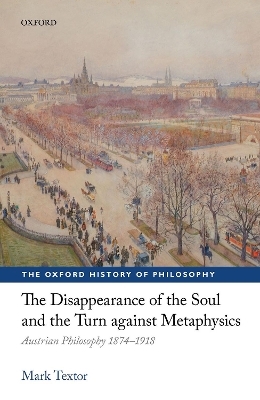
The Disappearance of the Soul and the Turn against Metaphysics
Oxford University Press (Verlag)
978-0-19-876982-8 (ISBN)
In the twentieth century English-language philosophy came to be science- and logic-oriented, and was suspicious of metaphysics. The Disappearance of the Soul and the Turn against Metaphysics traces our present philosophical outlook back to debates in Austro-German philosophy about the relation between empirical science and metaphysics: does empirical psychology depend on the metaphysics of the soul, the mental substance? The negative answer - that there is 'a psychology without a soul' - shaped Austrian philosophy and provided a model for ontologies that dispense with substances. Mark Textor tells the story of how and why (Austrian) philosophy turned against metaphysics . He introduces the key thinkers of the time, including the 'fathers of Austrian philosophy' Franz Brentano and Ernst Mach, whose Intentionalism (Brentano) and Neutral Monism (Mach) became distinctive and influential positions in the philosophy of mind. Textor goes on to use the 'psychology without a soul' view as a vantage point from which to reconstruct and assess the immediate pre-history and formation of analytic philosophy (Ward, Stout, Moore, Russell). While Austrian philosophers retired the soul, early analytic philosophers were happy to introduce a successor, the subject, and conceive of the mental as constituted by subject-object relations. The final part of the book returns to the theme of anti-metaphysics from a different perspective. In this part the early Moritz Schlick, who would soon become the leading figure of the Vienna Circle, takes centre stage. The final part of the book reconstructs Schlick's arguments for the conclusion that metaphysics lies beyond the limits of knowledge that are rooted in the philosophy of mind discussed in previous parts.
Mark Textor is Professor of Philosophy at King's College London. He previously taught in Bern, Hamburg, Munich, and Zurich. His main areas of research are history of analytic philosophy (especially Frege), philosophy of language, and philosophy of mind both from a historical (Brentano, Stumpf) and a systematic perspective.
Acknowledgements
The Players
Introduction
Part I: The Evaporation of the Soul- and other Substances
1: Psychology, the Science of the Soul
2: 'Psychology without a Soul'
3: From Substance and Accident to Complex and Element
Part II: Managing without the Soul: Intentionality, Dualism, and Neutral Monism
4: The Mental and the Physical, Only A Matter of Perspective?
5: The Mental and the Physical, an Intrinsic Distinction
6: The Intentionality Challenge
Part III: From Psychology without a Soul to Psychology with a Self and Beyond: The Anglo-Austro-German Axis 1886-1921
Introduction to Part III: 'Shocked and Disappointed'
7: Cambridge Psychology between Lotze and Brentano
8: The Rise and Fall of the Subject: A Case Study
9: Act/Content/Object, Act/Object, or Just Object?
Part IV: Intuition, Metaphysics and the Limits of Knowledge
Introduction to Part IV
10: Brentano's One-Term View of Judgement
11: Judgement in the Service of the Will - Voluntaristic Conceptions of Judgement
12: The Nature of Knowledge: Avenarius and Schlick
13: Drawing the Limits of Knowledge
14: Beyond the Limits of Knowledge
| Erscheinungsdatum | 06.09.2021 |
|---|---|
| Reihe/Serie | The Oxford History of Philosophy |
| Verlagsort | Oxford |
| Sprache | englisch |
| Maße | 165 x 242 mm |
| Gewicht | 720 g |
| Themenwelt | Geisteswissenschaften ► Philosophie ► Geschichte der Philosophie |
| Geisteswissenschaften ► Philosophie ► Metaphysik / Ontologie | |
| Geisteswissenschaften ► Philosophie ► Philosophie der Neuzeit | |
| ISBN-10 | 0-19-876982-2 / 0198769822 |
| ISBN-13 | 978-0-19-876982-8 / 9780198769828 |
| Zustand | Neuware |
| Informationen gemäß Produktsicherheitsverordnung (GPSR) | |
| Haben Sie eine Frage zum Produkt? |
aus dem Bereich


